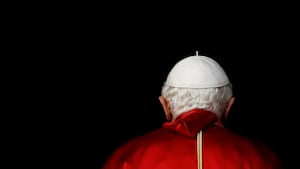The retired Pope Benedict XVI has come forward with an unusual confession. Rather than sticking with a highly contested denial that he knew nothing about the scores of predatory priests who were moved around German parishes when he was in charge of the Munich diocese, he now says he did know about at least one of them.
In a statement issued over the weekend first to German media outlets and then to the Catholic News Agency, Benedict’s personal secretary Georg Gänswein sought to correct the record for the ailing ex-pontiff.
Gänswein admitted that Benedict did tell independent investigators hired by the German Catholic Church that he had no recollection of his proven attendance at a hearing about Father Peter Hullermann, a priest accused of abusing at least 23 boys aged 8 to 16. Gänswein says Benedict “would now like to make it clear that, contrary to what was stated during the hearing, he took part in the ordinariate meeting on Jan. 15, 1980.” Hullermann went on to allegedly abuse children until he was finally pulled from active priesthood in 2010.
“The statement to the contrary was therefore objectively incorrect,” Gänswein said in a statement about what the former pope told investigators. “He would like to emphasize that this was not done out of bad faith, but was the result of an error in the editing of his statement. He will explain how this came about in the pending statement. He is very sorry for this mistake and asks for this mistake to be excused.”
Last week, the German law firm commissioned to investigate the German church found that before he was elected pope, Joseph Ratzinger was directly involved in at least four cases of predatory priests who he approved to be reassigned in full knowledge of multiple abuse allegations against them. Benedict led the Munich diocese from 1977 to 1982, when he was promoted to the Holy See to head the Congregation for the Doctrine of the Faith by his predecessor, Pope John Paul II.
But at the meeting in question, those in attendance who cooperated with the law firm’s investigation said Hullermann’s troubling situation was indeed discussed and that it was decided that since he admitted to sexually abusing a child, he would be given accommodation in Munich—under Ratzinger’s charge—while he received therapy. He was not at that time removed from active parish duty or kept from children. That would come later—when he was moved to a tourist parish in 2008 where he was described as “outgoing and friendly—especially with young people.”
Gänswein sought to clarify Benedict’s position—when he errantly told the investigators he wasn’t at a meeting he clearly attended—as an “editing error” referring to the agenda of the meeting, rather than whether he was there. “Objectively correct, however, and documented by the files, is the statement that no decision was made in this meeting about a pastoral assignment of the priest in question,” he said. “Rather, only the request to provide him with accommodation during his therapeutic treatment in Munich was granted.”
As it happened, an underling in the Munich diocese, Monsignor Gerhard Gruber, went on to accept all responsibility in Hullerman’s transfer. Benedict is now expected to issue further clarification, according to Gänswein, after he has completely reviewed the 1,900-page report by German investigators.
Benedict, now 94, was the first pope in more than 400 years to retire, which occurred in 2013. His successor, Pope Francis, has not publicly commented on the German church scandal. The Vatican press office referred all questions to Gänswein.







